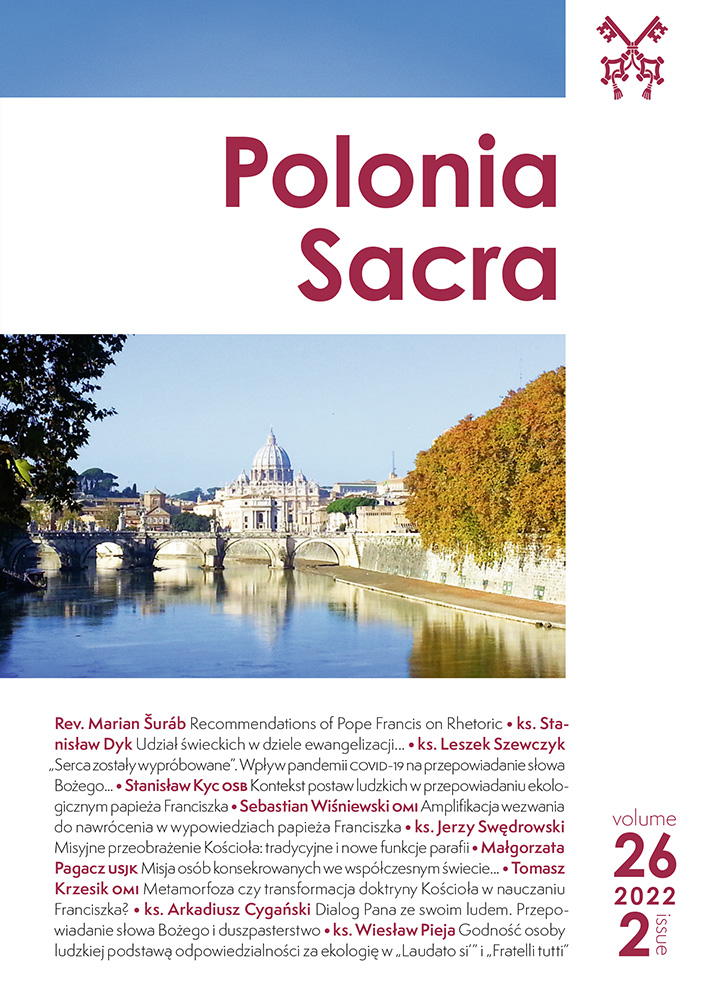Human Dignity as the Basis of Responsibility for Ecology in “Laudato si’” and “Fratelli tutti”
DOI:
https://doi.org/10.15633/ps.26210Keywords:
ecology, Francis, dignity, conversionAbstract
A study of the content of the papal encyclicals Laudato si’ and Fratelli tutti allows for the following observations. First, Francis looks at ecology according to a hermeneutic of continuity, that is, he takes up the teaching of John Paul II on human ecology and develops it by writing about integral ecology. Second, Francis notes that integral ecology demands concern for the environment on the part of individuals, institutions, nations, and international communities. Third, according to Francis, it is not technological development alone that contributes to the destruction of the world, but man’s lack of willingness for self-restraint. Consumerism, which goes hand in hand with a “culture of rejection,” demands conversion. This conversion is necessary for both believers and non-believers. The Pope addresses his appeal to all people because they are human beings, citizens of a created world. Man, as a creature of God, is joined to other creatures, but the fact that he is created in the image and likeness of God determines his unique dignity. From this comes responsibility for the rest of creation in accordance with the command to “subdue the earth” (Gen. 1:28). Human concern for creation can be considered on the levels of ecology, human ecology and integral ecology. Moreover, the fact of humanities neglect of creation demands a discussion of ecological conversion. Man should take care of creation because, with his rational nature, he surpasses it. Ecological conversion is part of the work of the new evangelization in the Church and is connected to the transformation of the consciousness of contemporary man in accordance with the Good News of Jesus Christ recalled by Pope Francis.
References
Benedykt XVI, Caritas in veritate.
Benedykt XVI, Deus caritas est.
Bortkiewicz P., Grzech ekologii: pomijanie porządku stworzenia i Stwórcy, w: Ekologia a duchowość chrześcijańska, red. S. Niziński, Poznań 2009, s. 94–104.
Dańczak A., Kreatywne przeżywanie natury — teologiczne podstawy duchowości ekologicznej, „Ateneum Kapłańskie” 155 (2010) z. 1 (608), s. 126–135.
Dziedzic J., Kościół a ekologia ludzka, „Polonia Sacra” 23 (2019) nr 1, s. 103–126.
Franciszek, Audiencja generalna Skażeni przez kulturę odrzucania, 05.06.2013, „L’Osservatore Romano” wyd. pol. (2013) nr 8–9, s. 48–49.
Franciszek, Fratelli tutti.
Konferencja Episkopatu Polski, W trosce o wspólny dom. List pasterski Episkopatu Polski w liturgiczne wspomnienie św. Franciszka z Asyżu, 04.10.2018, https://opoka.org.pl/biblioteka/W/WE/kep/ekologia_04102018.html (12.10.2021).
Machinek M., Wspólny dom. „Ekologiczna” encyklika papieża Franciszka, „Teologia i Moralność” 11 (2016) nr 1 (19), s. 71–72.
Orzeszyna J., Świadomość i odpowiedzialność ekologiczna wyznawców Chrystusa. Inspiracje katechetyczne, Kraków 2016.
Orzeszyna J., Świadomość i odpowiedzialność ekologiczna wyznawców Chrystusa. Inspiracje katechetyczne, Kraków 2016.
Orzeszyna J., Wybrane zagadnienia edukacji ekologicznej. Refleksje wokół „Ladato si’”. Inspiracje katechetyczne, Kraków 2016.
Orzeszyna J., Znaczenie motywacji religijnej w działaniach na rzecz ochrony naturalnego środowiska człowieka w świetle encykliki „Ludato si’”, w: Dlaczego ekologia? W kręgu encykliki „Laudato si’”, red. R. Reroń, A. Szafulski, Wrocław 2016, s. 79–95.
Rosiecki F. M., Człowiek a przyroda według Starego Testamentu, w: Między niebem a ziemią. Ku etyce ekologicznej, red. A. Dyduch-Falniowska, M. Grzegorczyk, Z. Kijas, Z. Mirek, Kraków 2000, s. 104–110.
Smoleński S., Powołanie chrześcijańskie. Zarys teologii moralnej, t. 1, Kraków 1978.
Sobór Watykański II, Gaudium et spes.
Soler I., „Laudato si’”: nawrócenie ekologiczne dla wszystkich!, 01.07.2015, https://www.ekai.pl/laudato-si-nawrocenie-ekologiczne-dla- wszystkich/ (01.02.2022).
Żułcińska W., Świat w 2050 roku według Toffer Associates, 18.10.2010, https://www.computerworld.pl/news/Swiat-w-2050-roku-wedlug-Toffler-Associates,363214.html (01.02.2022).
Downloads
Published
Issue
Section
License

This work is licensed under a Creative Commons Attribution 4.0 International License.
Authors who publish with this journal agree to the following terms:
- Authors retain the copyright and full publishing rights without restrictions, and grant the journal right of first publication with the work simultaneously licensed under a Creative Commons Attribution 4.0 International License that allows others to share the work with an acknowledgement of the work's authorship and initial publication in this journal.
- Authors are able to enter into separate, additional contractual arrangements for the non-exclusive distribution of the journal's published version of the work (e.g., post it to an institutional repository or publish it in a book), with an acknowledgement of its initial publication in this journal.
- Authors are permitted and encouraged to post their work online (e.g., in institutional repositories or on their website) prior to and during the submission process, as it can lead to productive exchanges, as well as earlier and greater citation of published work (See The Effect of Open Access).

